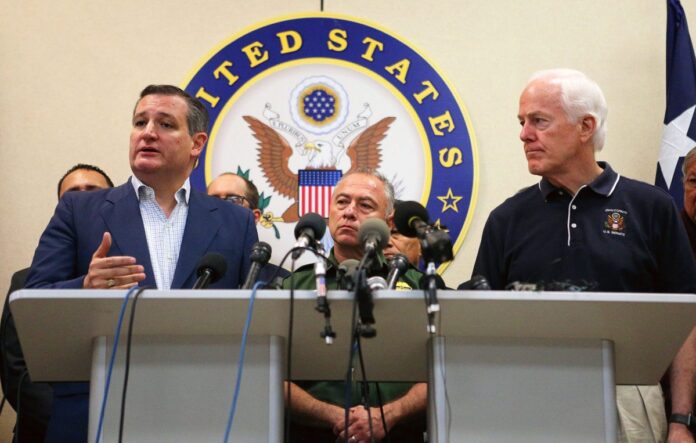
By MITCHELL FERMAN
Staff Writer
WESLACO — The two Texas senators walked through the immigrant detention center in Brownsville and met mothers not separated from their children, a bit of a departure from President Donald Trump’s recently-implemented “zero-tolerance” policy.
These mothers, however, were just 16 or 17 years old, Sen. Ted Cruz recalled. Cruz and Sen. John Cornyn met several such women at the Southwest Key Casa Presidente Immigration Detention Center on Friday. Their babies were just 8 weeks old, or thereabouts — born at the hospital near the detention center.
What will eventually happen to the mothers is uncertain, but the newborns are American citizens.
“It breaks your heart,” Cornyn said inside the U.S. Border Patrol station in Weslaco, after he led an hour-long, wide-ranging roundtable with Cruz where some federal and local officials asked questions and others tried to provide answers about the Trump administration’s policy.
That policy, announced in April by U.S. Attorney General Jeff Sessions, has since resulted in the separation of some 2,300 immigrant children from their parents along the U.S.-Mexico border.
The scenes of young immigrant mothers with children took place at Casa Presidente, the facility that houses children under 10 years of age. The two senators also toured the other holding facility that’s received attention in Brownsville, Casa Padre, where only boys between 10 and 17 year of age are housed.
Following the tours, the senators, together in the Rio Grande Valley for the first time — though admittedly under unpleasant circumstances — held a roundtable at the Weslaco station where there was a mob of media, a larger saturation than multiple local officials ever recalled seeing at one time in South Texas.
After the Weslaco event, Cruz described the scenes at the detention centers — kids in classrooms, teachers teaching, video game systems, basketball courts, soccer fields and pool tables. Some watched the World Cup while others watched “Thor: Ragnarok,” Cruz said.
But the senators’ tour was just for them and several staffers. The detention centers have been especially private about who’s allowed inside. U.S. Sen. Jeff Merkley, D-OR, was blocked from entering earlier this month.
So why are these facilities, contracted by the U.S. Department of Health and Human Services, so private?
“I don’t know,” Cruz said. “I think they’re trying to protect the kids’ safety and privacy, I’m assuming that’s a factor. It was not unlike a school. But it’s nothing like you see at Ursula.”
The junior senator was referring to Border Patrol’s centralized immigration processing center, located on Ursula Avenue in McAllen, where Merkley described as seeing kids in “dog kennels.”
The facility is kept cold and is known as “La Hielera,” or “The Icebox,” where immigrants are seen huddled in thermal blankets to keep warm.
That facility is where children have often been separated from their parents under the Trump administration’s zero-tolerance policy, charging adults with illegal entry in federal courts, most notably at the McAllen courthouse, according to Ryan Patrick, U.S. Attorney for the Southern District of Texas. He also participated in Friday’s roundtable.
After an outcry from advocates, elected officials and the public in recent weeks, Trump signed an executive order on Wednesday to end family separations. What exactly that will look like, however, is unclear.
“That was a question I asked Ryan,” Cruz said. “I’m not sure what the implementation of the order will be, and I’m not sure every federal agency knows exactly how the order will be implemented.”
Cruz has introduced a bill to keep families together and to provide more resources to process asylum claims, including doubling the number of federal immigration judges and expediting the review process of asylum cases. Cornyn said Friday he supports the legislation.
On Monday, Cruz said he’ll meet with Sens. Dianne Feinstein, D-Calif., and Dick Durbin, D-Ill., about the bill, and in hopes of finding compromise. But Cruz is uncertain whether this will happen.
“A number of Democrats have reached out and expressed an interest in working with me on this legislation,” Cruz said.
Just a week prior, Cruz was slightly more defiant about family separations.
“As a U.S. citizen, if you commit a crime and get arrested, you’re separated from your kids,” Cruz said during a June 11 interview in his office. “And if you’re the only caregiver, your children have to find alternative caregivers — whether family members, friends or foster care. What all the media attention on separation of families is really saying, is don’t incarcerate those who come here illegally.”
When asked what changed between then and Friday, Cruz pivoted.
“For several years, children have been suffering enormously because of illegal immigration,” he said. “I was down here in 2013, in 2014 at the detention camps that the Obama administration had set up. And many of the Congressional Democrats were far less eager to address the problem when it was the Obama administration, the same was true for a lot of media outlets.
“Nobody wants to see children taken from their parents — that doesn’t make sense,” Cruz continued. “And it’s entirely possible to enforce the law while keeping families together.”



